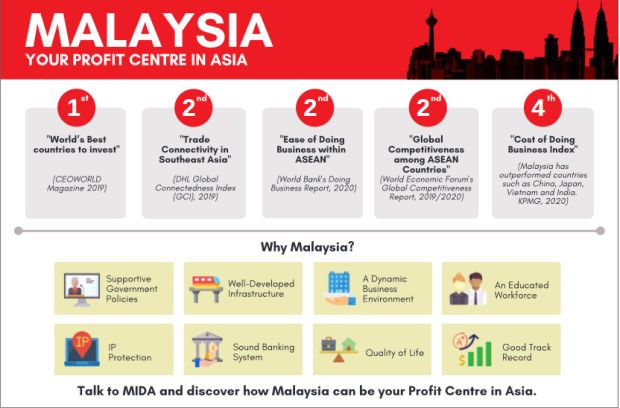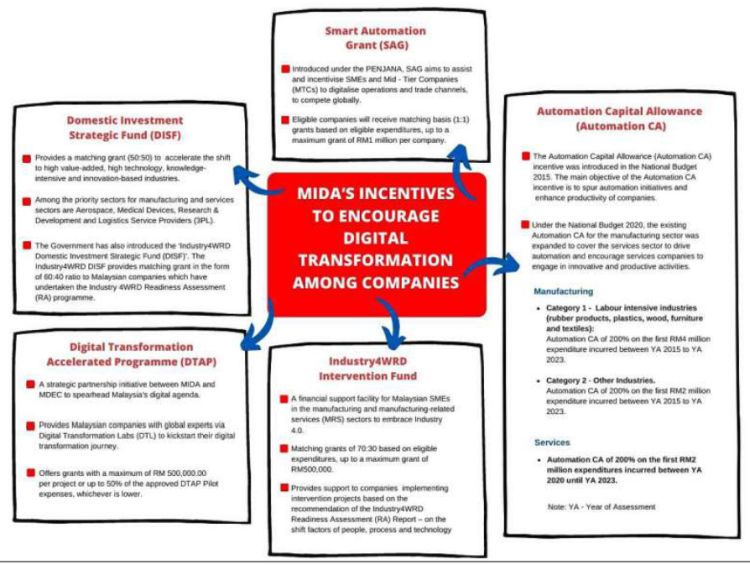MIDA eyes quality investments
22 Mar 2021

The Malaysian Investment Development Authority (MIDA) is intensifying its efforts to attract high quality investments to boost Malaysia’s status as a globally competitive trading nation despite the Covid-19 health crisis.
As the Government’s principal investment promotion agency under the International Trade and Industry Ministry, MIDA recognises the challenges in the global business landscape – including regional and new emerging economies – and has undertaken various strategies to address the issues.
MIDA chairman Datuk Abdul Majid Ahmad Khan (pic) said Malaysia has adopted selective and targeted approaches to bring in high quality investments.
“We no longer have this idea of investment based on labour intensive projects because we are facing more competition, and there are new emerging centres attracting such foreign investment. We don’t promote low end assembly-type operations anymore, ” he said in a virtual interview.
On quality investments, he emphasised that the priority is on projects that are high-value added, high technology, knowledge-intensive, research and development and design (R&D&D), skills-intensive, and provide high income jobs.
“For research, we have incentives for multi-national corporations (MNCs) to conduct their R&D in Malaysia, then we can learn and acquire knowledge. “We must also have strong linkages with domestic industries and generate multiplier effects to support us in picking up our ecosystem so that prosperity can be shared as we upgrade our skills to meet the requirements of the companies (investing in Malaysia), ” he said.

Other quality investments include projects which are able to, among others, develop new growth areas, introduce new and emerging technologies, and transform Malaysia into a regional and global production and service hub.
“Despite the international border closures and strict standard operating procedures in place worldwide to contain the spread of Covid-19, MIDA continues to be responsive in undertaking innovative and aggressive promotion activities to entice foreign direct investment (FDI) through its 20 overseas and 12 regional offices, ” Abdul Majid said.
He explained that Malaysia recorded total approved investments of RM164.0bil last year, of which domestic direct investment (DDIs) accounted for RM99.8bil (60.9%) whereas FDI accounted for RM64.2bil (39.1%). The total investments approved are for 4,599 projects which are expected to create 114,673 jobs.
In 2020, the manufacturing sector accounted for 55.7% of these investments at RM91.3bil, followed by the services sector (RM66.7bil/ 40.7%) and the primary sector (RM6.0bil/3.6%).
This year, MIDA expects investments in high-tech manufacturing, global service centres, Principal Hub, healthcare, education, logistics, green technology and R&D.
“MIDA will continue to be at the forefront to entice more quality investments in the areas of technology and innovation to position Malaysia as an alternative supply chain hub in Asia.
“Through policy reviews and targeted approaches, the Government will ensure that Malaysia remains as the preferred investment location with a favourable environment for quality investments in Asia, ” said Abdul Majid.
In this regard, the key strategic directions are:
> New sources of investment opportunities (green field) by leveraging on the megatrends in development, digital economy, ecommerce and Industry 4.0.
> Niche technologies within existing industries by identifying the gaps and completing the value chain.
> Drive existing companies (brown field) to reinvest in high value-added products and undertake high value activities or services.
> MIDA’s Lighthouse Project concept to enable MNCs and local corporations that successfully gain from Industry 4.0 transformation to guide and support Malaysia’s local manufacturing industries to also implement the Fourth Industrial Revolution processes in gaining business traction.
On Industry 4.0, Abdul Majid said: “I think the Covid-19 situation has changed the industry’s perception on the importance of utilisation of automation. This has affected the attitude and help to expedite (the technology adoption process).”
He said that to date, 382 companies in the manufacturing sector have been granted automation capital allowance – another major incentive programme to encourage domestic companies to undertake automation and machine upgrading.
Currently, there are RM65.9bil worth of potential investments in the pipeline in the manufacturing and services sectors under MIDA’s purview, he said. This involves 1,043 projects in high technology industries such as advanced electrical and electronics (E&E) and aerospace; halal industry; creative industry; biomass industry; and agriculture industry (relating to smart farming) which have huge prospects in generating high value-added activities and products as well as creation of high-skilled employment opportunities for Malaysians.
Abdul Majid hopes that the Covid-19 health crisis will be contained soon and the majority of the projects in the pipeline can be realised with proactive actions taken through MIDA’s Project Acceleration and Coordination Unit (PACU) which liaises with the related companies and stakeholders.
PACU also provides advisory services to start-ups and conglomerates through its one-stop centre concept, whereby investors are encouraged to discuss the challenges faced during operations and seek much-needed clarification and advice on government guidelines and procedures.
Additionally, MIDA through its e-TRANS system has launched and enhanced several online modules – namely faster approval for applications for e-manufacturing licence, e-incentive, and import duty and/or sales tax exemption– to expedite the execution of projects.
Among others, the Government undertook a major initiative last year to bolster investment and cushion the impact of the pandemic through its four economic stimulus packages – Prihatin, Prihatin SME Plus, Penjana and Kita Prihatin – which involved total allocation of RM305bil. This has also provided a boost for MIDA’s efforts.
Besides that, MIDA’s incentives to encourage automation among companies through its Smart Automation Grant, Domestic Investment Strategic Fund (DISF), Digital Transformation Accelerated Programme, Industry4WRD Intervention Fund and Automation Capital Allowance are expected to drive further potential investments for Malaysia.
To date, MIDA has approved grants totalling RM2.1bil under the DISF since the fund was established in July 2012. The allocation involved 407 projects with investment value of RM18.4bil.
Abdul Majid said MIDA is fully optimising the Malaysia Digital Blueprint (2021-2030) or MyDigital, and Industry 4.0 (automation) mechanism introduced by the Government to drive quality investments.
Since 2017, the Government initiated the National E-Commerce Strategic Roadmap, and in 2018 the Industry4wrd policy has accelerated Malaysia’s digital adoption in businesses, education and societies. This helps the nation’s industries – from manufacturing, healthcare, electrical and electronics to ecommerce – digitise to support the country’s recovery.
In line with the Government’s aspiration, MIDA has put in place a comprehensive and competitive facilitation and investment schemes to continue to attract more high quality investments into the country.
He said the Government recognises the need to develop high-technology sectors as one of the strategies to sustain the momentum of economic growth as well as to improve the competitiveness and resilience of the Malaysian economy.
“We continue to attract quality investments with greater specialisation in the 3+2 catalytic sectors highlighted under the 11th Malaysian Plan, namely the E&E, machinery and equipment, chemicals, aerospace and medical devices industries, as well as other potential new growth areas.
“We hope that these five industries will raise us to achieve high income nation status, and also supports the country’s Shared Prosperity Vision 2030, ” he said.
On the approval of companies seeking various incentives, he said: “We want to make sure there is a transfer of technology. These companies collaborate with our institutions of higher learning where our researchers or people are attached to or employed by them to increase the transfer of technology. We want local companies to emerge as national champions.
“We have done well in the rubber and rubber products sector. We have produced world champions in glove production. We have four to five Malaysian glove companies supplying 80% of world requirement, ” he said, adding that MIDA hopes the E&E and semiconductors providers could achieve similar success.
“We have several Malaysian players who produce components and are service providers; they were national champions, and then became global players. If we can do this, I think we have reaped success on the foreign investments in terms of high technology, ” he said.
MIDA’s relentless efforts in promoting the domestic investment ecosystem has translated into the formation of a dedicated unit named the Domestic Investment Coordination Platform (DICP), which plays a significant role in providing the missing link between businesses, funding, technology and research capability.
Another notable initiative by MIDA was the setting up of a one-stop centre last Oct 2 to ease the movement of business travellers by expediting the approval of their entry into Malaysia to carry out their business activities.
The strong presence of FDI brought in by MIDA since the early days of the country’s industrialisation has helped to upgrade and diversify the range of products and services and promoted the growth of the local supply chain ecosystems and related services industry. Today, over 5,000 companies from more than 40 countries have made Malaysia their location for manufacturing and related services operations.
“Malaysia is also the gateway to Asean, which has a market of over 620 million people. We as a member of Asean should leverage the strength of other nations for the business community to tap into.
“We are optimistic that with vaccination, we can return to production and help to create demand and put the whole cycle into play, ” said Abdul Majid.
“Our hope is that entrepreneurs and the private sector will respond positively to the Government’s initiatives – the various incentives, new processes introduced for ease of business and utilisation of Industry 4.0. It is a major step to restart the economy and also bring Malaysia to the next level.”
Source: The Star


